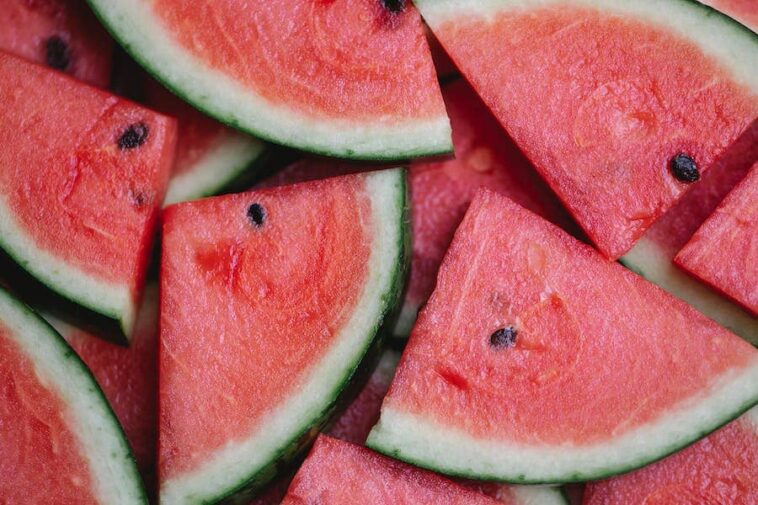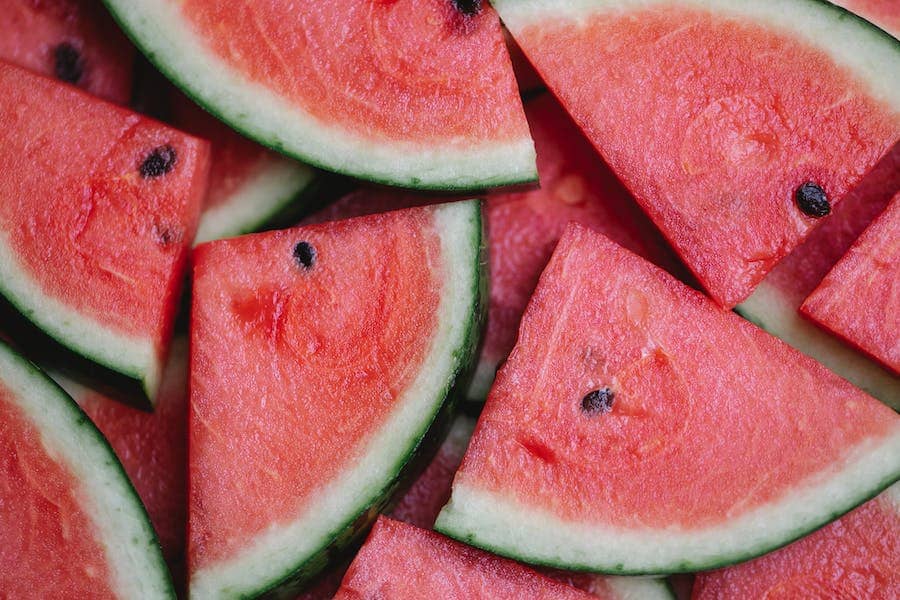Picture this: It’s a scorching summer day, and you’re craving something sweet, juicy, and utterly refreshing. The solution, of course, seems obvious—grab a slice of watermelon. Its vibrant pink or red flesh glistens with droplets of cool, hydrating goodness, making it a quintessential summer treat. But what if, after indulging in this delightful fruit, you find yourself sprinting to the bathroom with an unexpected case of diarrhea?
In this article, we embark on a quest to answer the perplexing question that has left many puzzled: “Why does watermelon give me diarrhea?” We’ll delve into the intricate world of watermelon and explore the possible reasons behind its digestive effects. So, let’s put on our investigative hats and get ready to uncover the juicy mystery of watermelon and its sometimes unwanted consequences.
Why Does Watermelon Give Me Diarrhea?

Watermelon can sometimes cause diarrhea due to factors like its fiber content, sugar levels, sorbitol content, the presence of FODMAPs, or bacterial overgrowth in the digestive system. These factors can vary from person to person, leading to different digestive reactions when consuming watermelon.
Watermelon: A Summertime Favorite
Before we dive into the topic at hand, let’s take a moment to appreciate the wonder that is watermelon. This fruit, with its vibrant pink or red flesh and black seeds (or seedless varieties), is a staple at picnics, barbecues, and pool parties. Its high water content, natural sweetness, and crisp texture make it a delightful snack for beating the heat.
The Nutritional Profile Of Watermelon
Watermelon isn’t just about quenching your thirst; it also provides some essential nutrients. Here’s a quick look at its nutritional profile:
Hydration:
Watermelon is a hydration superstar, with approximately 90% water content. This makes it an excellent choice for staying hydrated on hot summer days or after physical activities.
Vitamins:
Watermelon serves as a good source of essential vitamins, particularly vitamins A and C. Vitamin A is crucial for maintaining healthy skin, vision, and a robust immune system. Vitamin C, on the other hand, is well-known for its immune-boosting properties and its role in collagen production, which is vital for skin health.
Minerals:
While watermelon may not be as mineral-rich as some other fruits, it still contains small amounts of important minerals like potassium and magnesium. Potassium plays a key role in regulating blood pressure and supporting proper muscle and nerve function, while magnesium is essential for overall muscle and heart health.
Lycopene:
Watermelon owes its vibrant red color to the presence of lycopene, a potent antioxidant. Lycopene has been linked to potential protective effects against certain diseases, particularly some types of cancer and heart disease. Consuming foods rich in lycopene, like watermelon, may contribute to your overall health.
Dietary Fiber:
While not exceptionally high in fiber compared to some other fruits, watermelon still offers a modest amount of dietary fiber. This fiber can aid in digestion and contribute to a feeling of fullness, which can be helpful for those looking to manage their appetite and maintain a healthy weight.
So, beyond its delightful taste and thirst-quenching properties, watermelon brings a valuable array of nutrients to the table, making it a great addition to your summer menu. Whether you’re lounging by the pool or enjoying a picnic in the park, savoring a slice of watermelon not only satisfies your taste buds but also provides essential vitamins, minerals, and hydration to keep you feeling your best during the hot months.
The Fiber Factor With Watermelon
One possible reason why watermelon can lead to digestive discomfort, including diarrhea, is its fiber content. While watermelon contains fiber, it’s not particularly rich in this department compared to some other fruits and vegetables. However, for individuals who have sensitive digestive systems or are not used to consuming fiber-rich foods, even the moderate amount of fiber in watermelon can lead to gastrointestinal issues.
Fiber is an essential component of a healthy diet, as it promotes regular bowel movements and supports overall digestive health. However, abrupt increases in fiber intake, especially when you’re not accustomed to it, can have the opposite effect. It can cause bloating, gas, and, in some cases, diarrhea.
The Sugar Quandary
Another factor that might contribute to watermelon-induced diarrhea is its sugar content. Watermelon is naturally sweet, thanks to the presence of sugars like fructose and glucose. While these sugars are generally well-tolerated by most people, excessive consumption of sugary foods can sometimes lead to digestive distress.
If you consume a large amount of watermelon in a short period, the sugar content may overwhelm your digestive system, leading to symptoms like diarrhea or stomach cramps. This is more likely to happen if you have fructose malabsorption, a condition where your body has difficulty absorbing fructose.
Sorbitol Sensitivity
Watermelon also contains a sugar alcohol called sorbitol. Sorbitol is known for its laxative effect, as it can draw water into the intestines and lead to loose stools or diarrhea, especially when consumed in excess.
If you have sorbitol sensitivity or sorbitol intolerance, even a small amount of watermelon may trigger digestive issues. Some individuals are more sensitive to sorbitol than others, and their reactions can vary from mild discomfort to more severe symptoms.
Fodmaps: A Potential Culprit
FODMAPs (Fermentable Oligosaccharides, Disaccharides, Monosaccharides, and Polyols) are a group of poorly digestible carbohydrates found in various foods, including some fruits. Watermelon, although low in FODMAPs compared to many other fruits, still contains small amounts of certain FODMAPs, such as fructans and sorbitol.
For individuals with irritable bowel syndrome (IBS) or sensitivity to FODMAPs, consuming watermelon can trigger gastrointestinal symptoms, including diarrhea. It’s worth noting that the FODMAP content in watermelon may vary depending on factors like ripeness and variety.
Bacterial Overgrowth
In some cases, watermelon-induced diarrhea may be linked to bacterial overgrowth in the small intestine. When there is an excessive growth of bacteria in the small intestine, it can lead to malabsorption of nutrients and digestive symptoms, including diarrhea.
The natural sugars in watermelon can provide a ready source of nourishment for these bacteria, contributing to their overgrowth and subsequent digestive issues.
How To Enjoy Watermelon Without Digestive Distress
If you love watermelon but find that it gives you diarrhea or digestive discomfort, don’t fret. There are ways to enjoy this summer delight without the unwelcome side effects:
- Moderation: Instead of indulging in an entire watermelon at once, practice moderation. Enjoy smaller portions spread throughout the day.
- Ripe And Fresh: Opt for ripe watermelon, as it may be easier to digest. Overripe watermelon, on the other hand, can ferment in the gut and lead to digestive problems.
- Remove Seeds: If you’re eating a watermelon variety with seeds, consider removing them to reduce the risk of gastrointestinal irritation.
- Hydrate: Since watermelon is primarily water, it’s essential to stay hydrated when consuming it. Drink plenty of water alongside your watermelon to help with digestion.
- Consider Allergies: Some individuals may have allergies to certain fruits, including watermelon. If you suspect an allergy, consult a healthcare professional for guidance.
- Know Your Limits: If you have known sensitivities to sugars or FODMAPs, be mindful of your watermelon consumption and its potential effects on your digestive system.
- Digestive Aids: You can try digestive aids or enzymes that may help your body break down the sugars and fiber in watermelon more efficiently.
Conclusion
Watermelon is a beloved summer fruit known for its refreshing taste and hydrating properties. While it offers several health benefits, some individuals may experience diarrhea or digestive discomfort after consuming it. This can be due to factors such as the fruit’s fiber content, sugar levels, sorbitol content, FODMAPs, or bacterial overgrowth.
If you find that watermelon gives you diarrhea, it’s essential to understand your body’s limits and make dietary adjustments accordingly. Moderation, choosing ripe fruit, and staying hydrated can help you continue to enjoy this summer favorite without digestive distress. If symptoms persist or worsen, consult a healthcare professional to rule out any underlying conditions or allergies. Remember, everyone’s digestive system is unique, so what affects one person may not affect another in the same way.





